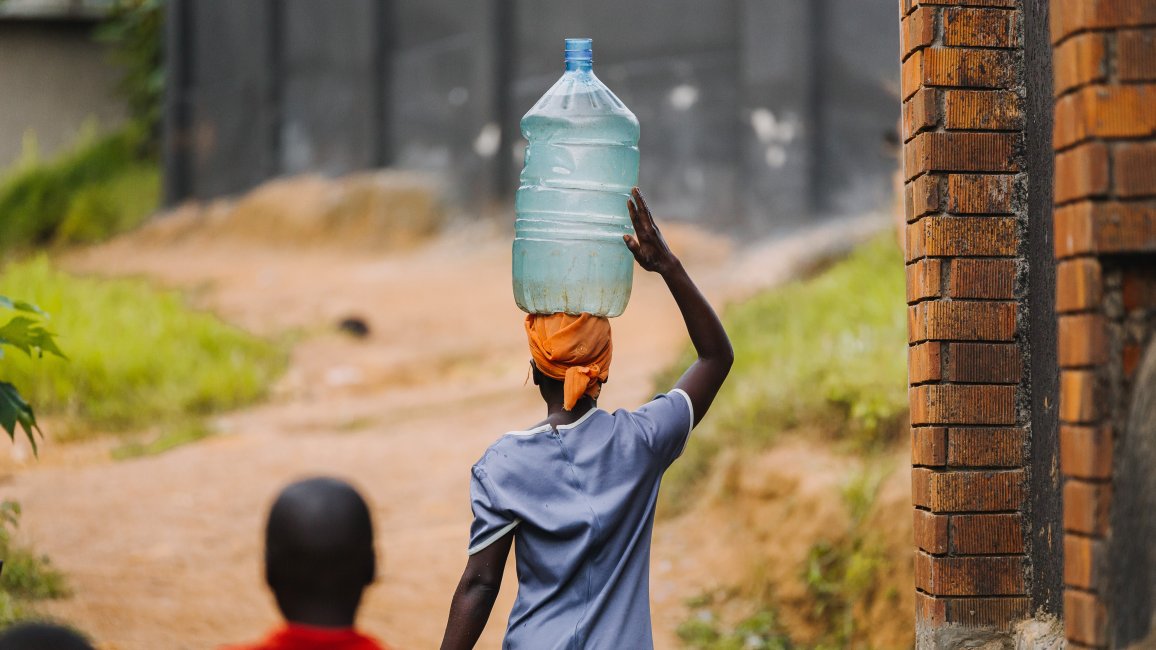World Water Day - How PET bottles contribute to supply
‘Water for Peace’ (1) is the motto of this year’s United Nations action day (2). The background – safe drinking water is essential. And is hard to access in many parts of the world. This is where plastic bottles show their benefits – they make drinking water available, provide rapid assistance in emergencies and can be recycled after use.

Enable a mobile drinking water supply: lightweight and sturdy plastic bottle containers.
The UN has declared 22 March 2024 the 31st World Water Day, to highlight the key importance of access to clean drinking water. Not everyone will necessarily think of plastic bottles in this context, but their special properties make it possible to sustainably support a reliable and rapid supply of drinking water.
Ideal for mobile use
Crises in many places unfortunately shape world affairs. And every acute situation, be it a conflict or an environmental disaster, requires immediate action, such as providing supplies as quickly as possible when infrastructure is destroyed. What plastic bottles can do: practical and hygienic plastic bottles can be taken to the sites quickly and easily in order to alleviate the initial emergency until systems for treating drinking water on-site are up and running.
The lightweight and unbreakable PET bottles are also suitable as an aid for decentralised water distribution – especially in hard-to-reach or remote areas. Thanks to their light weight, the sturdy plastic bottles are also a useful utensil for refugees, who can only carry a small amount of luggage.
The needs are great: in 2022, more than 340 million people around the world were in need of humanitarian aid (3), 108.4 million were displaced (4), there were 421 natural disasters (5) and a total of 363 conflicts (6). Such as the war in Ukraine, with Ukraine asking for supplies of drinking water and PET bottles that year to supply its population (7).
Important approach to eradicating poverty
While PET bottles prove to be a key part of the supply chain in times of crisis, economically disadvantaged regions in developing and emerging countries can also benefit from plastic. In addition to the material’s robust and mobile properties, plastic bottles also make water accessible to socially disadvantaged sections of the population due to the low production costs.
Plastic waste is also increasingly being used as a recyclable material and a source of income. Take Mexico, for example, where the recycling companies IMER and PLANETA accept used PET bottles from collectors in return for a fee, including using their own lorries in rural areas with poor infrastructure – an engagement that combines waste management with combating poverty, which can reduce tensions.
Drinking water is indispensable. And a challenge. According to the UN World Water Development Report 2022, 2.2 billion people did not have a direct supply of safe drinking water (8). And UNICEF notes that in conflicts and crises, children are twice as likely to be deprived of access to water (9). Plastic bottles can make a significant contribution here – in keeping with the spirit of World Water Day.
(1) https://www.un.org/en/observances/water-day
(2) https://en.wikipedia.org/wiki/World_Water_Day
(3) https://www.rescue.org/de/artikel/die-zehn-schlimmsten-humanitaeren-kri…
(4) https://www.uno-fluechtlingshilfe.de/informieren/fluechtlingszahlen
(5) https://de.statista.com/statistik/daten/studie/249326/umfrage/anzahl-de…
(6) https://de.statista.com/statistik/daten/studie/2736/umfrage/entwicklung…
(7) https://brauer-bund.de/pressemitteilungen/ukraine-bittet-um-trinkwasser…
(8) https://www.unesco.de/kultur-und-natur/wasser-und-ozeane/weltwasserberi…
(9) https://www.unicef.de/informieren/aktuelles/blog/-/weltwassertag-2023-z…
Do you like our texts? Perhaps even so much that you want to use them in your own media? Then please get in touch with us beforehand!
